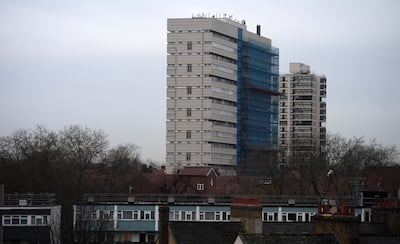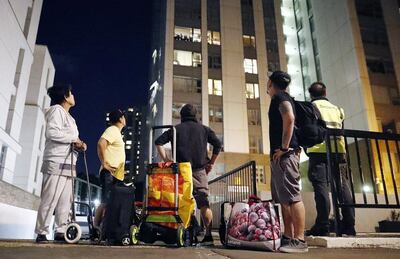The British government has given property developers two months to come up with £4 billion ($5.43bn) to pay for the removal of highly flammable cladding from homes — or risk legal action.
Housing Secretary Michael Gove outlined the plan in a stern letter to the industry, which brought the Grenfell Tower fire back into the spotlight more than four years after the tragedy struck.
He gave a warning that ministers are prepared to restrict access to government funding and future procurements, use planning powers and take companies to court if they are unwilling to co-operate on the measures.
The plan aims to solve the problems of leaseholders trapped in unsafe and unsellable low-rise flats fitted with hazardous cladding.
The June 2017 fire at Grenfell Tower in Kensington, west London, killed 72 people.
A 2019 inquiry found that the presence of combustible cladding with polyethylene cores on the building acted as a “source of fuel” for the blaze and was the “principal reason” the flames spread at such a rapid pace.

Nearly five years later, tens of thousands of buildings across the UK remain fitted with dangerous cladding.
Under government plans, leaseholders in buildings between 11 metres and 18 metres tall will no longer have to take out loans to cover the costs of remediation work despite no new money coming from the Treasury.
Instead, Mr Gove told developers to agree to start contributing this year to cover the “full outstanding cost”, which he estimates to be £4 billion.
Mr Gove set a deadline of “early March” to publicly accept his ultimatum and provide a “fully funded plan of action”.
“Our home should be a source of security and pride. For too many of the people living in properties your industry has built in recent years, their home has become a source of misery. This must change,” he wrote.
Mr Gove said he is confident that firms are also committed to fixing the “broken system” but cautioned that he is “prepared to take all steps necessary to make this happen”, including “the imposition of a solution in law if needs be”.
However, his vision is unlikely to go ahead in a smooth manner as some building firms and property developers who had the cladding fitted on to flats have since folded.
Mr Gove, who is responsible for Prime Minister Boris Johnson’s “levelling up” agenda insisted that individuals living in properties with unsafe cladding “wont’ be expected to pay the bill”.
He said people need to be able to get on with their lives and be confident that their homes are safe and it is only fair to expect property firms, most of whom are making “significant profits”, to cough up.
Speaking on BBC Radio 4’s Today programme, Mr Gove sought to dispel any uncertainty about the government’s intentions to stamp out unsafe cladding, insisting ministers will “absolutely” punish companies who fail to take the problem seriously.
He pointed to two instances where ministers had intervened to punish firms.

“Absolutely we will,” he said. “We’ve already taken action in some of the more egregious cases. One of the companies responsible for the cladding that was used on Grenfell Tower — Kingspan — was about to enter into a commercial relationship with Mercedes. The Grenfell community were quite rightly outraged by that. I intervened, I talked to Toto Wolff at Mercedes, he appreciated, not least because of Lewis Hamilton’s own sympathy with the Grenfell united community, and so that contract ended.”
He also pointed to the case in which Rydon Homes, a group linked to the Grenfell cladding, was denied taxpayer funding through the Help to Buy scheme.
“We have shown that we are prepared to ensure that the power of government is there in order to ensure justice is done,” Mr Gove added.
In an interview with Sky News, he said property developers should know that the government wants to “work with them” to resolve the issue but is prepared to use legal means if they won’t co-operate.
“If it is the case that it’s necessary to do so then we will use legal means and ultimately, if necessary, the tax system in order to ensure that those who have deep pockets who are responsible for the upkeep of these buildings pay, rather than the leaseholders, the individuals who in the past were being asked to pay with money they didn’t have for a problem they did not cause,” he said.
“It’s a straightforward question: Should it be those with the big bucks, the big profits, who have been responsible for the construction of these buildings and who are the ultimate owners of these buildings or should it be individuals who have worked hard in order to get a mortgage and who are now being saddled with costs for faults that were not their responsibility?
“If you put the question like that then I think there can only be one answer.”
The housing secretary was expected to meet cladding campaigners on Monday morning before detailing the plan in the Commons.
The government’s idea aimed at solving the cladding crisis was tentatively welcomed by campaigners who have been calling for safer homes since the Grenfell tragedy.
However, developers said they should not be the only ones responsible for the costs.
A spokesman for End Our Cladding Scandal said they were “cautiously optimistic” over the plans but noted the “devil is in the detail”, with the letter saying the measures do not “extend to non-cladding” costs.
“It’s a welcome step in the right direction but there’s still a long road to travel,” he said.
Stewart Baseley, executive chairman of the Home Builders Federation, accepted that leaseholders should not have to pay for remediation, but said builders should not be left alone to cover the costs.
He suggested the government should also pursue manufacturers of cladding “who designed, tested and sold materials that developers purchased in good faith that were later proved to not be fit for purpose.”
“While house builders are committed to playing their part, there are many other organisations involved in the construction of affected buildings, including housing associations and local authorities,” he said.
'They should have sorted things by now'
Thousands of residents of the Chalcots Estate in Camden, north London, were evacuated in the wake of the Grenfell tragedy after fire experts told the local council they could not guarantee the cladding was safe.
From 2006 to 2009 the council housing had been refurbished by Rydon, the same firm which worked on the Grenfell Tower. The group had fitted aluminium composite (ACM) cladding on outer walls at both sites.

Workers began to remove the material from Chalcots in the months after Grenfell and this work was completed in January 2018. New cladding and fire safety repairs were ordered for the 717 homes.
But more than four years on, many residents remain unhappy about the slow progress of the project and the nature of the refurbishments.
After investigators discovered combustible materials in some outer walls, new windows had to be ordered which meant that radiators and piping inside flats could not remain. The council recently signed a £77.2 million contract for “A1-fire-rated” cladding, windows and curtain walls to be installed on the 1960s estate.
New cladding is due to be fitted on the high-rise blocks from June.
Rosaline, a mental health worker who has lived on the estate for 15 years, questioned why the council and the government had not worked with developers to ensure the refurbishments be carried out at a faster pace.
“They should have sorted things out from day one,” she told The National.
“The government and the property developers … they are in very safe homes and no one is making the residents [of unsafe buildings] a first priority. It’s disgusting. The government has a responsibility for my safety.”
Having spent two months living in a hotel in the summer of 2017 while inspections were being carried out, Rosaline said she felt uncomfortable returning to her flat given that some unsafe cladding was still present.
Asked if she feels safe living in her home now she said “definitely not” and described her neighbours as “more panicky” since the Grenfell incident.
She also claims her community faced a “backlash” from people on social media who believed they were living in luxurious hotels paid for by the taxpayer.
“The hotel was extremely uncomfortable and disgusting. I had bed bugs in my bed. You would not allow your dog to stay in it,” she said.
“No one was comfortable to [return to] live here but we just had to. You just had to get back to your own place even if it’s not 100 per cent safe.
“People were saying we were scroungers. I work my butt off and like 99 per cent of people want to wake up in my own bed.”
Camden Council has been contacted for comment.


